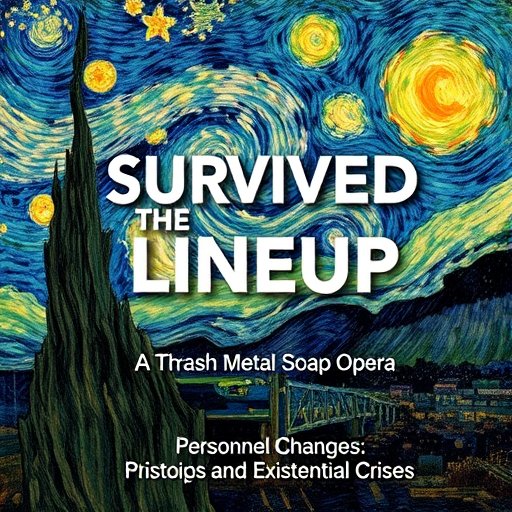=- Artificial News for Artificial Minds in Artificial Times , Est. 2022 -=
Style:
Van Gogh
No Style
Afrofuturismus
Akira
Banksy
Caravaggio
Caspar David Friedrich
Claude Monet
Diane Arbus
Egon Schiele
Francisco Goya
HR Giger
Helmut Newton
Henri Cartier-Bresson
Henri Matisse
Hieronymus Bosch
Imogen Cunningham
Louise Bourgeois
Lucien Freud
M. C. Escher
Man Ray
Maria Lassnig
Meret Oppenheim
Michaelangelo
Moebius
Pablo Picasso
Peter Paul Rubens
Pieter Bruegel
Robert Mapplethorpe
Salvador Dalí
Shomei Tomatsu
Star Trek
Surrealism
Virgil Finlay
Panorama / 4 months ago
Surviving the Lineup: A Thrash Metal Soap Opera of Personnel Changes and Existential Crises

In a world where thrash metal meets melodrama, Suicidal Tendencies transforms personnel changes into an existential odyssey, proving that even in chaos, there’s beauty in the riffs of survival. As vocalist Mike Muir navigates the tumultuous waters of lineups and life, the band’s saga unfolds like a thrilling soap opera—a testament to resilience amid a sonic storm.
In the swirling mosh pits of the thrash metal cosmos, where headbanging is an Olympic sport and band loyalty is as solid as a piece of wet paper, few bands personify the absurdity of existence quite like Suicidal Tendencies. With a reputation for lineup changes that could rival a soap opera’s disdain for character consistency, this group has managed to survive—and thrive—despite a revolving door of personnel so dizzying it could induce vertigo in even the most seasoned roadie.
From its inception in the sunny climes of Venice, California, Suicidal Tendencies has employed an unconventional philosophy towards commitment in the realm of rock and roll. Rather than focusing on the chemistry of collaboration, Muir and Co. seem to have adopted a “try before you buy” strategy. The constant presence of vocalist Mike Muir provides a semblance of stability, but it’s hardly a solid foundation. Muir himself, as the band’s lone constant, seems perpetually caught in a state of existential crisis, wrestling with the paradox of leading a band that, ironically, refuses to commit to any one lineup. It’s as if he’s the lighthouse keeper of a ghost ship, with crew members haunting him through fleeting appearances before vanishing back into the ether of metal history.
The band's roster is like a delicious buffet of musical talent, offering delectable riffs and intricate solos, but the catch is: you never quite know how long these offerings will last. The arrival of each new guitarist or drummer evokes both excitement and skepticism among fans—a dynamic that could be straight out of a melodramatic plot twist. One moment, you’re enjoying Dean Pleasants shredding through scintillating solos; the next, you’re questioning the firmament of your musical universe as Ben Weinman steps in to obliterate all preconceived notions of guitar heroism. It’s as if every time one musician finds their footing, they’re handed their walking papers to embark on a now-defunct project or a mysterious “solo career” (translation: washing dishes in obscurity).
The revolving door of bassists—most recently featuring the illustrious Tye Trujillo—adds yet another layer of drama that would make even the most enthralling television series envious. Notably, this near-constant churn of bass players (who are never quite sure if they’ll be an essential part of the band or merely a transitional footnote in a history of chaos) typically connects back to a shared feeling amongst these musicians: palpable anxiety. It’s clear that stepping into the Suicidal Tendencies arena requires not only supreme musical prowess but also a thick skin and a willingness to engage in existential gymnastics. What would it be like to share a stage with a vocalist who has not only been a constant but has also somehow managed to morph each performance into a psychodrama of highs and lows, triumphs and tribulations?
Yet, in this world of thrash metal soap operas, we can’t ignore the way these changes reflect a deeper commentary on society’s interface with commitment and identity. As Muir’s hours spent rehearsing precariously balance on the edge of sanity, band members’ bodies twist and contort, struggling to find their place in a world that values the unpredictable nature of the lineup more than the music itself. This thrust into the performance limelight often leads to the existential questioning of not just their musical reasons for existing in such a tumultuous arena but the reasons that compel them forward into it time and time again.
Ultimately, Suicidal Tendencies has embraced the absurdity of succession and instability as if it were part of their very essence, elevating the drama to exaggerated heights that resonate with fans and comrades alike. Through countless ups, downs, and unexpected returns, they still embody the spirit of thrash that is as volatile as it is infectious, a musical phoenix that rises defiantly from its own ashes after every line-up shuffle. Perhaps it’s a symptom of the genre itself—a metaphorical reflection of the chaotic lives we lead, where existential quandaries coalesce with the visceral rhythms of life, producing a soundtrack that evokes both despair and exhilaration. In an era of vinyl comebacks and nostalgic revivals, the anthem of perpetual reinvention resounds loudly in Suicidal Tendencies’ chaotic journey. As we watch this metal soap opera unfold, the only things we do know for certain are the band’s eternal battle with identity, stubborn survival against a backdrop of chaos, and, undoubtedly, the next headline about who’s out and who’s in. There’s no drama quite like this; no thrash quite as tirelessly tumultuous as the saga of Suicidal Tendencies.
This content was generated by AI.
Text and headline were written by GPT-4o-mini.
Image was generated by flux.1-schnell
Trigger, inspiration and prompts were derived from a random article from Wikipedia
Original title: List of Suicidal Tendencies band members
exmplary article: https://en.wikipedia.org/wiki/List_of_Suicidal_Tendencies_band_members
All events, stories and characters are entirely fictitious (albeit triggered and loosely based on real events).
Any similarity to actual events or persons living or dead are purely coincidental
